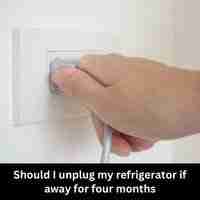Should I unplug my refrigerator If away for four months. When planning an extended absence from home, one question that may arise is whether or not to unplug the refrigerator.
Leaving appliances running while you are away can lead to concerns about energy consumption, safety, and potential malfunctions. However, when it comes to refrigerators, there are several factors to consider before making a decision.
We article will explore the pros and cons of unplugging a refrigerator for an extended period of four months and provide guidance on the best course of action to ensure the safety of your food and the longevity of your appliance.
Must Read: KitchenAid refrigerator water leak
Should I unplug my refrigerator if away for four months
To answer the question of whether to unplug your fridge or not, it is essential first to understand its role in your home.
Refrigerators are essential appliances that help to keep food fresh by preventing bacterial growth and maintaining a constant temperature below 40°F.
A refrigerator’s compressor system works by drawing heat out of the interior and expelling it to the outside, which keeps the contents cold.
Pros of Unplugging the Refrigerator
There are a few benefits to unplugging the refrigerator when away for an extended period. They include:
1. Energy Savings
Refrigerators consume a considerable amount of energy, making them one of the most significant contributors to your monthly electricity bill. By unplugging your fridge for four months, you can save a significant amount of energy costs.
According to EnergyStar, a typical fridge consumes about 350 to 600 kWh annually, depending on its size, age, and energy efficiency rating. This means that unplugging the fridge for four months could save up to 100 kWh, which translates to $10 to $15 on your electricity bill.
2. Reduced Wear and Tear
Refrigerators operate continuously to maintain the desired temperature inside, and this constant operation can cause wear and tear on the compressor, fans, and other moving parts.
By unplugging the fridge, you can reduce the wear and tear on these components, which could increase the appliance’s lifespan and save on repair costs.
3. Safety
Leaving your refrigerator plugged in for an extended period could pose a fire risk, especially if the appliance is old or has faulty wiring. Unplugging the fridge eliminates this risk, giving you peace of mind when you’re away from home.
Cons of Unplugging the Refrigerator
While there are some benefits to unplugging your fridge, there are also some potential drawbacks to consider. They include:
1. Food Spoilage
The most significant risk of unplugging the refrigerator is the potential for food spoilage. When you unplug the fridge, the temperature inside will rise, which could cause the food to spoil, and bacteria to grow.
Depending on the contents of your fridge, this could result in significant food waste, odor, and an unpleasant clean-up task when you return.
2. Potential Damage to the Appliance
Unplugging the fridge for an extended period could cause damage to the appliance. When you unplug the fridge, the oil and coolant in the compressor system could settle and cause damage to the compressor’s seals and other components.
Additionally, if the fridge is not thoroughly cleaned and dried before unplugging, it could develop mold or mildew, which could cause further damage.
3. Inconvenience
Unplugging the fridge also means that you’ll need to empty its contents, clean it thoroughly, and defrost it before you leave. This process could be time-consuming and inconvenient, especially if you have a large fridge with many items inside.
Alternatives to Unplugging the Refrigerator
If you’re concerned about the potential drawbacks of unplugging your fridge, there are some alternatives to consider. They include:
1. Adjusting the Thermostat
One option is to adjust the thermostat to a higher temperature to reduce energy consumption without completely shutting down the fridge. However, it is essential to ensure that the temperature remains below 40°F to prevent bacterial growth and food spoilage.
2. Investing in a Smart Plug
Another option is to invest in a smart plug that allows you to remotely control your fridge’s power. With a smart plug, you can turn the fridge off and on from your phone, ensuring that the temperature remains stable, and the food stays fresh.
3. Asking a Neighbor or Friend for Help
If you have a trusted neighbor or friend nearby, you could ask them to check on your fridge periodically and ensure that it is functioning correctly. They could also dispose of any spoiled food and clean the fridge if necessary.
4. Hiring a House-Sitter
If you’re going away for an extended period and have other concerns about your home’s security and maintenance, hiring a house-sitter could be a good option.
A house-sitter can not only take care of your fridge but also ensure that your home is safe and secure while you’re away.
FAQs
What should I do before unplugging my refrigerator for four months?
Before unplugging your refrigerator, you should remove all the food items and clean it thoroughly. Also, make sure that the doors are left slightly ajar to prevent the growth of mold and mildew inside.
If possible, defrost the freezer section and wipe it down with a dry cloth. Finally, unplug the refrigerator and move it away from the wall to prevent any dust accumulation.
Is it better to leave my refrigerator on or off if I’m going away for four months?
It’s generally better to turn off your refrigerator if you’re going away for four months to save energy and avoid potential mechanical issues.
However, if you have a newer refrigerator with energy-efficient features, such as a vacation mode, you might be able to leave it on while reducing energy consumption.
Can I damage my refrigerator by unplugging it for four months?
No, unplugging your refrigerator for four months won’t cause any damage to it. In fact, it might actually extend the lifespan of your refrigerator and prevent any mechanical issues that can arise from continuous use.
Bottom Line
Whether or not to unplug your refrigerator when away for four months depends on various factors. Unplugging the refrigerator can help save energy and reduce electricity costs. However, it also poses potential risks such as food spoilage, odors, and the formation of mold and mildew. If you choose to keep the refrigerator running, it is advisable to empty and clean it, adjust the temperature settings, and perform regular maintenance checks.
Alternatively, if you decide to unplug the refrigerator, ensure it is thoroughly cleaned, defrosted, and left with its doors slightly ajar to prevent odors and mildew. Additionally, consider using alternative methods such as dry ice or transferring perishable items to a smaller, portable fridge.
Ultimately, the decision should be based on your specific circumstances and the condition of your refrigerator. Consulting the manufacturer’s guidelines and seeking professional advice can help you make an informed choice to protect your food and the appliance during your extended absence.
Related Guides




